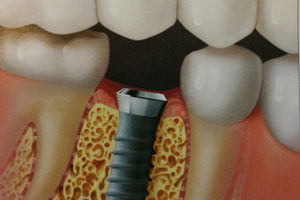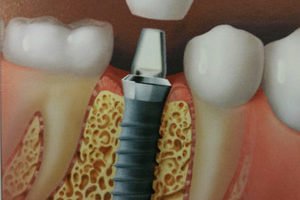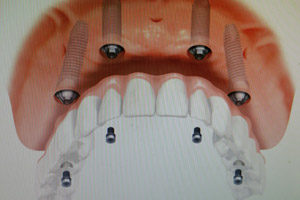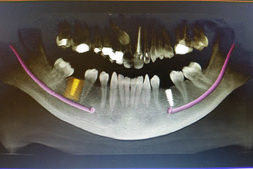
Dental Implants have changed the face of dentistry over the last 25 years. Dental Implants can replace single missing teeth, multiple missing teeth or be used as support for dentures or partials.
Dental Implants have changed the face of dentistry over the last 25 years. Dental Implants can replace single missing teeth, multiple missing teeth or be used as support for dentures or partials.
If you have missing teeth, you are a candidate for dental implants. It is important that you are in good health, as there are some conditions and diseases that can affect whether dental implants are right for you. For example, uncontrolled diabetes, cancer, radiation to the jaws, smoking, alcoholism, or uncontrolled periodontal (gum) disease may affect whether dental implants will fuse to your bone. It is important to let your dentist know all about your medical status (past and present) together with all medications you are taking, whether prescribed, alternative (herbal) or over-the-counter.
Where and how implants are placed requires a detailed assessment of your oral cavity. This will include compiling records that include study models of your mouth and bite, and specialized radiographs (x-rays), which may include 3D scans known as computerized tomograms (CT scans). Planning with the help of computer imaging ensures that dental implants can be placed in exactly the right position in the bone.
Placing dental implants requires a surgical procedure in which precision channels are created in the jawbone, often using a surgical guide. The implants are then fitted into the sites so that they are in intimate contact with the bone. They generally require two to six months to fuse to the bone before they can have tooth restorations attached to them to complete the process.
Natural teeth and dental implants may look the same, feel the same, and even function in a similar way, but they are very different. The most important differences are in the way they attach to the surrounding bone, their response to dental disease, their maintenance, and repair.
Teeth are susceptible to dental decay, periodontal disease, as well as the need for fillings or root canal therapy; dental implants are metal and do not decay, eliminating the need for fillings or root canals.
Teeth attach to the surrounding bone by a periodontal ligament made up of collagen fibers that join into the tooth on one side and bone on the other. Dental implants fuse directly to the bone.
Dental Implants are made of titanium, which is lightweight, strong and biocompatible, which means that it is not rejected by the body. Titanium and titanium alloys are the most widely used metals in both dental and other bone implants, such as orthopedic joint replacements. Dental implants have the highest success rate of any implanted surgical device.




Contact us today online to schedule an appointment or directly visit our clinic in Kansas City!
1805 NW Platte Road, Suite 140
Riverside, MO 64150
(816) 741-6000